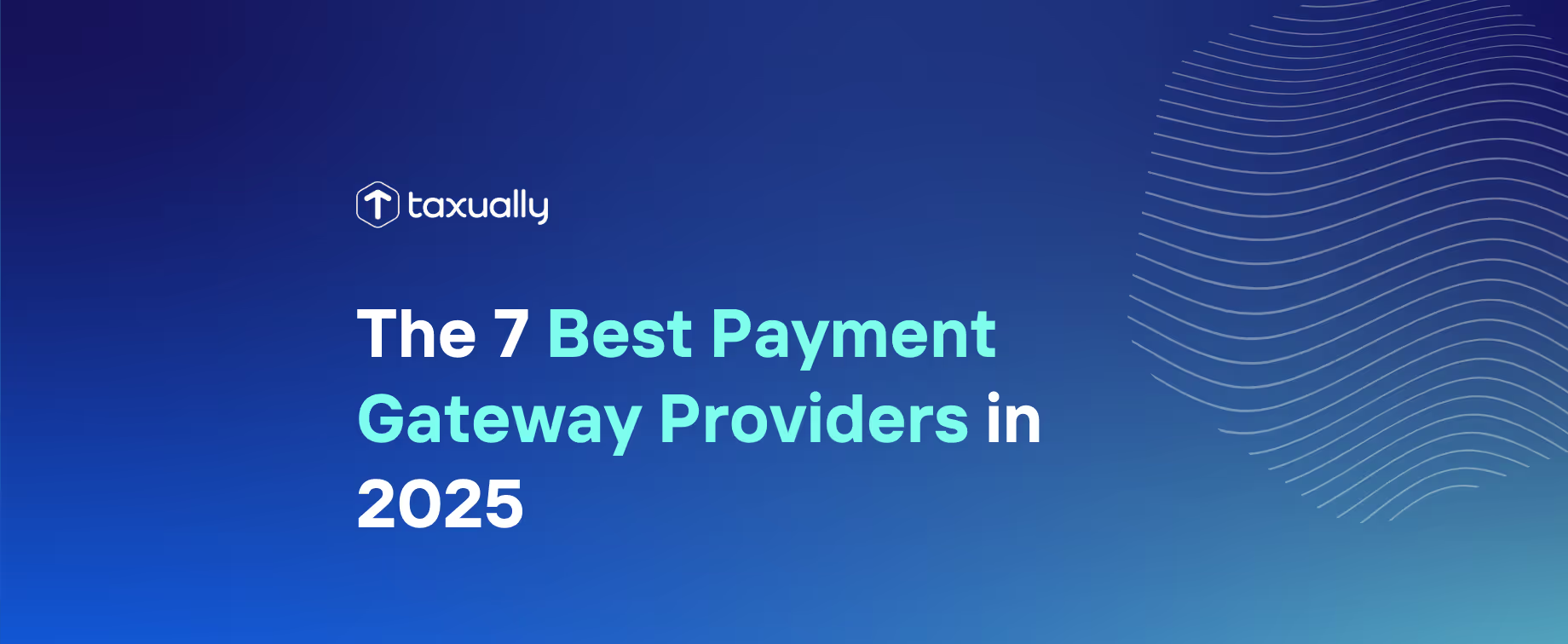Key takeaways
- Security and simplicity matter: Choose a PCI DSS–compliant payment gateway that offers secure transactions and a smooth checkout experience to build customer trust.
- Match your needs: Evaluate gateways based on fees, integration options, and supported payment methods to ensure they fit your business model and customer base.
- Think long-term: Opt for a scalable, globally supported payment solution that can grow with your ecommerce business and handle increasing transaction volumes.
In the ever-evolving landscape of online sales, selecting the right payment gateway for your ecommerce business is crucial. A payment gateway serves as the bridge between your online store and your customers' payment methods, ensuring secure and seamless transactions.
As we step into 2025 the options for payment gateways have expanded, offering advanced features and enhanced security measures. In this post, we'll explore the best payment gateways for ecommerce businesses in 2025.
What are payment gateways?
A payment gateway is a technology that facilitates online financial transactions by enabling the secure transmission of payment data between a customer, an online merchant, and a payment processor or acquiring bank. It serves as the intermediary that authorizes and processes online transactions, allowing businesses to accept electronic payments, such as credit card payments, debit card payments, digital wallet payments, and more.
Which is the right payment gateway for your business?

Choosing the right payment gateway for your business is an important decision that can significantly impact your online transactions and customer experience. With a plethora of options available, it's essential to select a payment gateway that aligns with your business model and customer preferences. Here are the key factors to consider when making this decision.
Security and compliance
The security of your customers' payment data should be your top priority. Look for a payment gateway that is Payment Card Industry Data Security Standard (PCI DSS) compliant. This ensures that sensitive information is encrypted and stored securely, minimizing the risk of data breaches.
User-friendly interface
A user-friendly checkout process can reduce cart abandonment rates. Opt for a payment gateway with a smooth and intuitive interface that easily integrates into your website or app. Customers should feel comfortable navigating through the payment process without any confusion.
Accepted payment methods
Different customers prefer different payment methods. Ensure the payment gateway supports a wide range of options, including credit/debit cards, digital wallets, and alternative payment methods. Catering to diverse preferences can enhance customer satisfaction.
Fees and pricing
Payment gateways charge various fees, including transaction fees and monthly subscriptions. Compare pricing structures and assess how they align with your business's transaction volume and revenue. Be wary of hidden fees that could eat into your profits.
Integration
Your payment gateway should seamlessly integrate with your ecommerce platform, website, or app. Whether you're using an off-the-shelf ecommerce solution or a custom-built platform, compatibility is essential to ensure smooth operations.
Global reach
If you're catering to an international audience, opt for a payment gateway that supports transactions in multiple currencies. Also, check if the gateway complies with regulations in the countries you operate in.
Customer support
Technical glitches can occur at any time. Having reliable customer support from your payment gateway provider is crucial to resolving issues quickly and minimizing disruptions to your business.
Scalability
As your business grows, your payment gateway should be able to handle increased transaction volume without performance hiccups. Scalability ensures that your payment system can evolve alongside your business.
Analytics and reporting
Access to transaction data, analytics, and reporting tools can provide valuable insights into your customers' behavior and help you make informed business decisions.
Reputation and reviews
Research the reputation of potential payment gateway providers. Look for reviews and testimonials from businesses similar to yours to gauge their experiences.
Top payment gateways
Here's our pick of the best payment gateways for ecommerce businesses.
PayPal
PayPal has emerged as a leading payment gateway for businesses, offering a simply and secure online transaction solution. As a versatile platform, it enables businesses to accept payments from customers worldwide, fostering growth and expanding their customer base.
With its user-friendly interface and widespread recognition, PayPal simplifies the checkout process, minimizing cart abandonment rates. Businesses can integrate PayPal into their websites or mobile apps with ease, allowing for a swift and efficient payment experience.
Pros:
- Global reach: PayPal's extensive international presence makes it an ideal choice for businesses looking to tap into a global market.
- User trust: The brand's strong reputation for security and buyer protection instills confidence in customers, potentially boosting conversion rates.
- Easy integration: Integration options ranging from simple "Buy Now" buttons to advanced APIs accommodate various business needs and technical capabilities.
- Multiple payment methods: PayPal supports credit/debit cards, bank transfers, and PayPal balance transactions, catering to diverse customer preferences.
- Mobile-friendly: With responsive design and mobile app compatibility, PayPal facilitates convenient mobile payments.
Cons:
- Fees: PayPal charges transaction fees, which can impact profitability, especially for small businesses with high sales volumes.
- Limited customization: While easy to integrate, PayPal's checkout experience might offer limited customization compared to building a fully bespoke payment solution.
- Account holds: In certain cases, PayPal may place holds on accounts, which could temporarily disrupt cash flow for businesses.
- Customer redirect: Some integration methods redirect customers to PayPal's site for payment, potentially causing friction in the checkout process.
- Dispute resolution: PayPal's buyer protection can sometimes lead to disputes that businesses need to navigate, consuming time and resources.
Stripe

Stripe is a popular online payment gateway designed to streamline and simplify payment processing for businesses of all sizes. With its developer-friendly infrastructure and user-friendly interface, Stripe has become a favored choice for ecommerce companies, startups, and established businesses looking to accept online payments securely and efficiently.
Stripe's robust features and customization options make it an attractive solution for businesses aiming to enhance their checkout experience and manage transactions seamlessly.
Pros:
- Easy integration: Stripe's API is well-documented and easy to integrate into various platforms, websites, and mobile apps, allowing businesses to start accepting payments quickly.
- Customization: The platform provides customizable payment forms, enabling businesses to maintain brand consistency and provide a smooth, branded checkout experience.
- Wide payment support: Stripe supports a wide range of payment methods, including credit and debit cards, digital wallets like Apple Pay and Google Pay, and local payment options, catering to a global customer base.
- Subscription management: Businesses can set up and manage subscriptions, recurring billing, and tiered pricing models with ease, making it suitable for subscription-based services.
- Security: Stripe employs advanced security measures, such as PCI DSS compliance and tokenization, to ensure sensitive payment data is protected.
- Developer-friendly: Developers appreciate Stripe's developer tools, extensive documentation, and flexibility, making it easy to implement custom solutions and troubleshoot issues.
Cons:
- Transaction fees: While Stripe offers competitive pricing, transaction fees can accumulate, impacting businesses with high transaction volumes.
- Account holds: Stripe's risk management system might occasionally trigger account holds or freezes, leading to disruptions in cash flow for businesses.
- Direct customer support: Some users have reported challenges in getting direct customer support from Stripe, relying largely on online documentation and resources.
- Chargebacks: Dealing with chargebacks can be complex and time-consuming, as Stripe generally sides with the customer in disputes, potentially leaving businesses vulnerable to fraudulent claims.
- Learning curve: For businesses new to online payments or without technical expertise, integrating and configuring Stripe might require a learning curve.
- Payout delays: Stripe's payout schedule may lead to delays in receiving funds, which could impact businesses with tight cash flow.
Amazon Pay
Amazon Pay is a widely recognized and integrated payment gateway that offers businesses a trouble-free way to facilitate online transactions. Leveraging Amazon's extensive customer base and trust, this payment solution aims to enhance the checkout experience, increase conversion rates, and simplify the payment process for both customers and merchants.
With Amazon Pay, businesses can offer a familiar and secure payment option, allowing customers to use their Amazon credentials to complete transactions on external websites. This smooth integration potentially reduces cart abandonment rates and fosters customer loyalty through its association with the trusted Amazon brand.
Pros:
- Customer trust: Amazon Pay leverages Amazon's strong reputation for security and reliability, instilling confidence in customers during the payment process.
- Simplified checkout: It enables customers to use their Amazon account information, reducing the need for manual data entry and expediting the checkout process.
- Mobile-friendly: Amazon Pay is optimized for mobile devices, catering to the increasing trend of mobile shopping and enhancing user experience.
- International reach: With Amazon's global presence, businesses can tap into a vast international customer base without the need for complex international payment setups.
- Reduced friction: By offering a familiar and trusted payment method, Amazon Pay can potentially reduce friction in the purchasing journey and lower cart abandonment rates.
Cons:
- Fees: Amazon Pay charges transaction fees, which can vary based on the transaction volume and other factors, potentially impacting a business's bottom line.
- Limited customization: While it offers integration options, the customization of the checkout experience might be more limited compared to some other payment gateways.
- Dependency on Amazon: Businesses relying solely on Amazon Pay may face risks if Amazon makes changes to its service offerings or terms.
- Competitive landscape: Amazon Pay competes with other established payment gateways, so businesses should consider their target audience and whether Amazon Pay aligns with their customers' preferences.
- Account requirements: Customers need an existing Amazon account to use Amazon Pay, potentially excluding those who don't have one or prefer not to use Amazon's services.
Worldpay
Worldpay, now known as FIS Worldpay after a merger with FIS, is a prominent payment gateway solution catering to businesses seeking streamlined online payment processing. As a leading global player in the payment processing industry, Worldpay offers a comprehensive suite of services that enable businesses to accept a wide range of payment methods securely and efficiently.
With its user-friendly interface and robust infrastructure, Worldpay empowers businesses to enhance customer experience and drive revenue growth through seamless transactions.
Pros:
- Diverse payment methods: Worldpay supports various payment options, including credit and debit cards, digital wallets, and alternative payment methods, accommodating a broader customer base.
- Global reach: With its international presence, Worldpay allows businesses to transact in multiple currencies and expand their operations globally.
- Security: Worldpay prioritizes security, offering advanced fraud protection measures and compliance with industry standards, instilling confidence in both businesses and customers.
- Customization: The platform provides customizable checkout options to maintain brand consistency and offer a tailored payment experience.
- Analytics and insights: Worldpay offers reporting tools that provide businesses with valuable insights into transaction data, helping them make informed decisions.
Cons:
- Cost structure: Worldpay's fee structure might involve various charges, such as setup fees, transaction fees, and monthly fees, which can potentially impact a business's profitability.
- Complex integration: While efforts have been made to simplify integration, businesses with less technical expertise might find the initial setup and integration process challenging.
- Customer support: Some users have reported varying levels of customer support, which could potentially lead to delays in addressing technical issues or concerns.
- Contractual commitments: Worldpay contracts may come with long-term commitments, which could restrict businesses seeking more flexibility in their payment processing solutions.
- Service reliability: There have been occasional reports of service outages or technical glitches, highlighting the importance of a reliable backup plan for uninterrupted operations.
Shopify Payments

The payment gateway Shopify Payments is tailored for businesses utilizing the Shopify ecommerce platform. As an integrated solution, it simplifies the payment process for online stores, offering a straightforward and secure way for businesses to accept payments from customers.
This gateway eliminates the need for third-party providers, simplifying the setup and management of payment processing. With built-in features and fraud protection tools, Shopify Payments ensures a reliable and trustworthy payment experience for both businesses and customers.
Pros:
- Simplicity: Effortlessly integrates into the Shopify platform, eliminating the need for third-party integrations and simplifying setup.
- Unified dashboard: Manage products, inventory, and payments all within a single platform, enhancing efficiency.
- Security: Shopify Payments is compliant with the Payment Card Industry Data Security Standard (PCI DSS), assuring secure transactions and customer data protection.
- Transparent pricing: Clear and competitive pricing with no additional transaction fee when using Shopify Payments as the payment gateway.
- Faster payouts: Offers quicker access to funds, typically within 2-3 business days, accelerating cash flow for businesses.
Cons:
- Limited availability: Available primarily in select countries, potentially restricting access for businesses operating outside these regions.
- Chargebacks: Businesses may experience chargebacks due to disputes or fraud, impacting revenue and potentially incurring fees.
- Restricted products: Certain high-risk or regulated products might face limitations or additional scrutiny when using Shopify Payments.
- Customization limitations: While well-integrated, businesses looking for highly customized payment experiences might find some restrictions within the Shopify Payments framework.
- Account holds: In some cases, Shopify Payments may hold funds or suspend accounts temporarily if unusual activity is detected, potentially causing inconvenience for businesses.
Square
Square is renowned for its user-friendly solutions that cater to businesses of all sizes. Designed for both online and in-person transactions, this versatile payment gateway provides an array of features to simplify payment processing, making it an attractive choice for businesses both established and new.
With its user-friendly interface and integration capabilities, Square empowers merchants to efficiently manage their sales and revenue.
Pros:
- Ease of use: Square's intuitive interface makes it easy for businesses to set up and start accepting payments quickly.
- Versatility: Whether it's in-person payments via mobile devices, online payments through an e-commerce website, or even invoicing, Square covers multiple payment scenarios.
- Integration: Square can be easily integrated with various point-of-sale systems, ecommerce platforms, and accounting software, enhancing business efficiency.
- Security: Square employs robust security measures to protect customer data, including encryption and tokenization, helping build customer trust.
- Analytics: The platform offers insightful sales analytics, aiding businesses in understanding customer behavior and making informed decisions.
Cons:
- Fees: While Square's pricing is transparent, the processing fees might be relatively higher for certain businesses, particularly those with high transaction volumes.
- Account holds: Square's risk assessment system could occasionally lead to account holds or fund freezes if it detects suspicious activity, causing disruptions to cash flow.
- Limited support: Some users have reported challenges in obtaining timely customer support, which could be problematic for businesses in urgent need of assistance.
- Chargebacks: Managing chargebacks can be complex, and Square's dispute resolution process might not always be straightforward for merchants.
Adyen
Adyen is a payment gateway solution that empowers businesses to facilitate secure online transactions across a wide range of payment methods and global markets. Known for its flexibility and scalability, Adyen integrates easily with ecommerce platforms, allowing merchants to accept payments through credit and debit cards, as well as alternative methods like digital wallets, bank transfers, and more.
Its robust infrastructure offers real-time data insights and analytics, enabling businesses to optimize their payment processes and enhance customer experiences.
Pros:
- Global reach: Adyen supports a vast array of payment methods from around the world, making it ideal for businesses aiming to expand internationally.
- Unified platform: By offering a single platform for various payment methods, Adyen simplifies operations and minimizes the need for multiple integrations.
- Security: Adyen employs advanced security measures like encryption and tokenization to protect sensitive payment information, ensuring secure transactions.
- Data insights: The platform provides merchants with real-time analytics and reporting, helping them make informed decisions to improve conversion rates and overall business performance.
- Customization: Adyen allows businesses to tailor the payment experience, from branding to localization, to maintain a consistent and appealing customer journey.
Cons:
- Complex setup: While Adyen offers comprehensive features, its initial setup might require technical expertise, making it less suitable for smaller businesses without dedicated IT resources.
- Cost structure: Adyen's pricing can be intricate, with various fees depending on factors like transaction volume, payment methods, and geographic coverage.
- Customer support: Some users have reported mixed experiences with Adyen's customer support, with occasional delays in issue resolution.
- Regulatory compliance: Adyen's global reach necessitates adherence to a variety of regional regulations, potentially adding complexity to compliance efforts.
- Learning curve: Due to its extensive functionality, mastering all of Adyen's features might take time, particularly for businesses new to payment gateways.
Conclusion
Selecting the right payment gateway is a crucial decision that can significantly impact your ecommerce business's success. In 2025, the options are diverse and advanced, catering to various business needs and customer preferences.
Whether you prioritize ease of use, security, customization, or global reach, the payment gateways mentioned in this article offer a spectrum of features to enhance your online payment experience. Analyze your business requirements and customer expectations to make an informed choice that aligns with your goals.
Do you run an ecommerce business and need help with your VAT compliance? Book a free call with one of our VAT experts to find bespoke solutions for your business, optimize your VAT costs, and reach millions of new potential customers.
Frequently asked questions
New Year's Day - 1/1/2024Memorial Day - 5/27/20244th of July - 7/4/2024Labor Day - 9/2/2024Thanksgiving Day - 11/28/2024Day after Thanksgiving - 11/29/2024Christmas Eve - 12/24/2024Christmas Day - 12/25/2024
What is a payment gateway and why is it important for ecommerce?
A payment gateway securely processes online payments between your store and customers, enabling credit card, debit card, and digital wallet transactions. It’s essential for ensuring safe, fast, and reliable online payments.
How do I choose the right payment gateway for my business?
Look for a gateway that balances security, ease of use, pricing, and integration with your ecommerce platform. Consider your customers’ preferred payment methods and whether you need multi-currency or global support.
What are the most popular payment gateways in 2025?
Leading options include PayPal, Stripe, Amazon Pay, Shopify Payments, Worldpay, Square, and Adyen—each offering different strengths in global reach, customization, and scalability.
How do payment gateway fees work?
Most gateways charge transaction-based fees, with some adding setup or monthly costs. Always review fee structures and check for hidden charges that could impact your profit margins.
Can payment gateways help with business growth?
Yes. Scalable gateways with analytics and multi-currency support can help manage rising sales volumes, improve checkout experiences, and build customer trust as your ecommerce business expands.



















